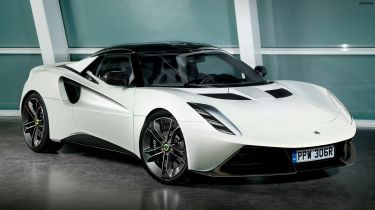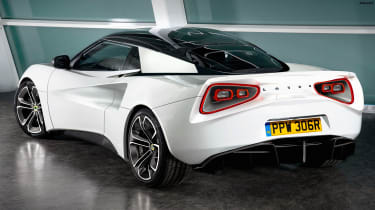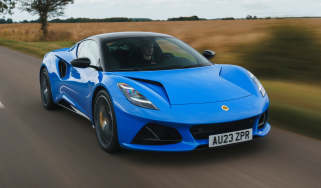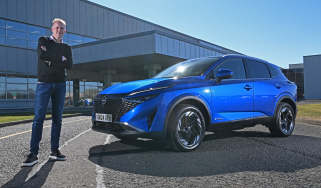Lotus abandons petrol power for all-electric future
The next Lotus sports car will be petrol, but after that all of the brand’s future cars will be full EVs
Lotus is undergoing the biggest shake-up in its 72-year history, and it will shift its focus to developing a fleet of fully electric sports cars, Auto Express can reveal.
Lotus has been under the ownership of Chinese car giant Geely since 2017, and it has already demonstrated its intent with the launch of the electric Evija hypercar. However, that is a car that will cost in excess of £2.4million and only 130 examples will ever be built. Now bosses have hinted that a new sports car due to arrive next year could be the firm’s last to use a petrol engine.
The company’s CEO, Phil Popham, has suggested that the next generation of Lotus sports cars will skip hybrid technology and follow the path set out by the Evija, by becoming fully electric. Speaking exclusively to Auto Express, Popham told us: “One thing we do believe in is the future of battery electric vehicles, and our intention is to offer BEV on our products in future.
“BEV is really well suited to sports cars – the torque characteristics, the weight distribution, design and flexibility of dynamics. For me it all leads to BEV as the ultimate technology for sports cars.”
Lotus’s next-generation electric sports car is expected to arrive towards the end of 2022, but our exclusive images show how it could look. It’s likely that Lotus will look to move beyond the firm’s current price range of between £45,000-£85,000 in order to increase profits and move the brand into a more desirable area of the market.
By Popham’s own admission, “familiarity around Lotus is quite low today” and he added “the money that is going into product development is something we could never, ever afford to do on our own if we hadn’t got the ambitious owner that we have.”
Hybrid technology is seen by most car manufacturers as a stepping stone to fully electric powertrains. However, Lotus’s outlook is different to many, because the firm believes the technology doesn’t suit what it’s trying to achieve with its new breed of sports cars. “One of the challenges of a hybrid,” Popham explained, “is you carry a small engine as well as batteries and electric motors, which goes against the philosophy of sports cars, which have a tight package. You want to minimise weight and maximise performance and spread weight in the right places to get the right dynamics. So hybrids do present a challenge.”
A fully electric system, according to Popham, allows far greater freedom when it comes to the design and layout of the physical powertrain. “The other thing with EV sports cars,” Popham added, “is distribution of weight. Batteries are flexible, you aren’t trying to build a car around some big componentry such as gearboxes and engines, so that gives you some flexibility.”
The new breed of EV sports car will also be underpinned by a new platform which, according to Popham, will allow Lotus to “leverage the asset” so that it can “support multiple cars”.
Ahead of that, Lotus is applying the finishing touches to a new sports car, which is due to be revealed in the middle of next year. Popham described the new model as a “significant engineering programme” that addresses “some of the negatives of our current cars” such as space, storage and on-board connectivity. “All of those will be modern technology,” Popham added, “but it will absolutely drive and handle like a Lotus.”
The company has made a “significant” investment at its base in Hethel, Norfolk, including building a new assembly hall where the sports car replacement will be made.
All options are open for Lotus EV line-up
Once Lotus has an established its fleet of electric sports cars, the company will look to broaden its product range with the addition of saloons, GT cars and possibly even SUVs.
“We’re not focusing on SUVs at the moment,” Popham revealed to Auto Express, “but we are not discounting any segment: crossovers, sporting sedans, GTs. But what we have to do is say what makes it distinctly a Lotus.”
Being part of the Geely group gives the firm access to a multitude of platforms, powertrains and technology. However, Popham was clear that any future Lotus had to stay true to the brand’s core values. “How can we illustrate what we are focused on, what we are famous for – aerodynamics, performance, light weight,” he said. “How can it be a Lotus in the segment in which it competes? And not just crafting a car and sticking a badge on it to make money.”
It’s also a possibility that future Lotus models could be built in China at one of parent firm Geely’s several facilities, as well as its base in Norfolk.
What do you think of Lotus’ plans to go all-electric? Let us know your thoughts in the comments section…
Find a car with the experts










